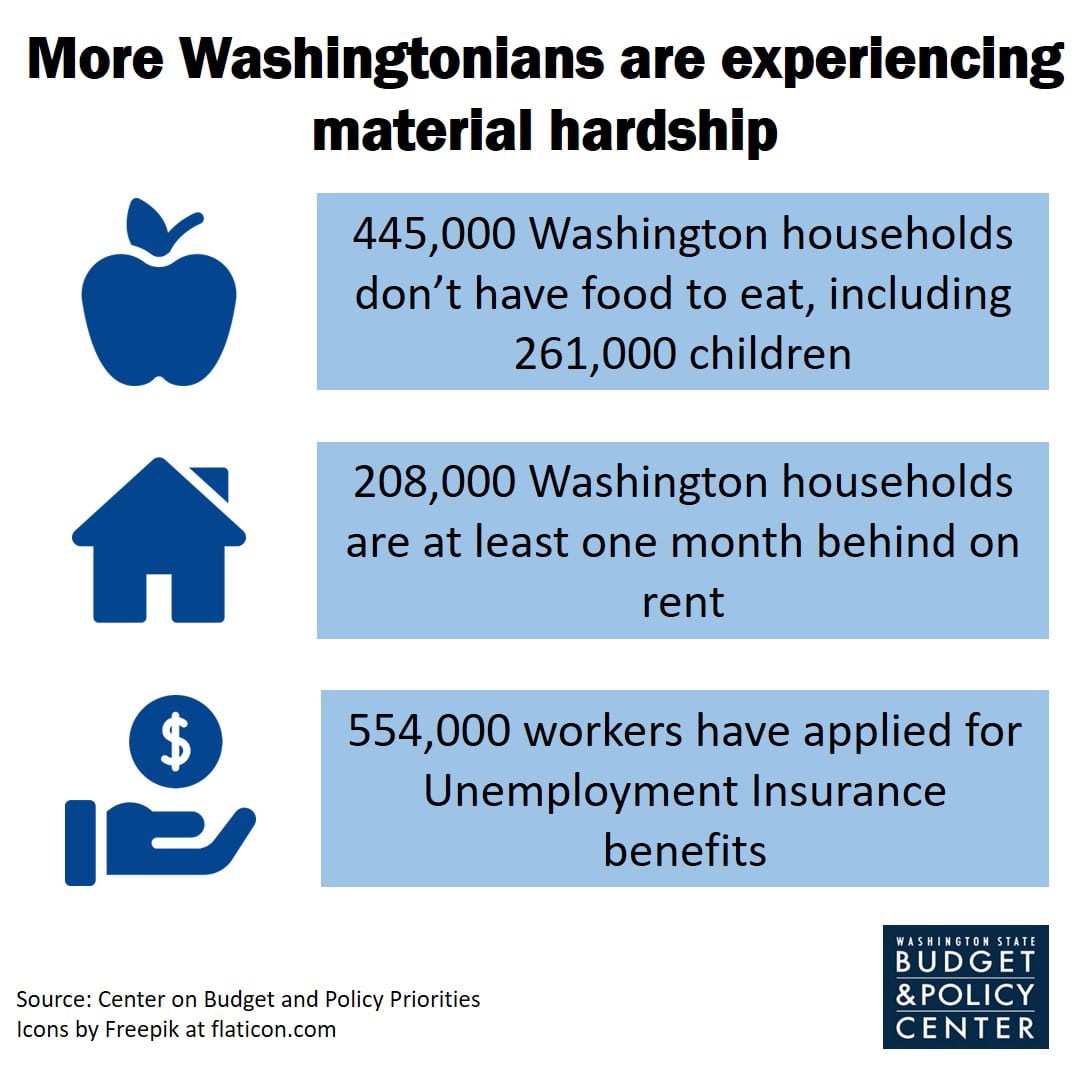As COVID-19 cases spike across the nation and millions face ongoing economic insecurity, Senate Republicans have largely failed to include robust and flexible aid to states, territories, tribal governments, and local governments as part of their newly unveiled plan. This aid is badly needed in order to avoid damaging cuts that would further weaken our economy and harm those most impacted by the pandemic.
Washington’s economic downturn leaves the state facing an $8.8 billion budget shortfall through 2023. As we have already written, recent economic forecasts show that Washington’s economy is careening downward at great speed, making economic stimulus an absolute necessity for an equitable recovery.
The federal government must step up and pass significant and flexible federal relief to state and local governments. In addition, state lawmakers can and should raise revenue to ensure we have enough resources to maintain services and make the investments we need to get Washingtonians through this crisis. Still, more will be needed to manage this crisis. Cutting state services and jobs will devastate the economy and guarantee a prolonged recession.
Federal aid can prevent increased economic hardship
As a result of historical and persistent institutional racism, the economic fallout of the COVID-19 crisis is hitting Black, Latinx, Indigenous and immigrant households the hardest – causing dramatic increases in unemployment and leaving many families unable to pay rent and afford food. New findings from the Center on Budget and Policy Priorities show a sharp rise in economic hardship for tens of millions of people, many of them children.
The report finds that in Washington state:
- 445,000 households do not have enough food, including 261,000 children
- 208,000 households are already at least one month behind on rent
- 554,000 people have applied for unemployment insurance
Addressing these pressing needs requires more resources and swift action by federal lawmakers to pass aid on to the state. State leaders must increase investments in public health, education, and social services to respond to COVID-19 and alleviate this economic hardship. As families struggle to meet basic needs, cash, food, and housing supports are crucial to protect public health. Schools also face an urgent need for new technologies to facilitate online learning – and in school districts that are reopening, there’s an increased for facility cleaning and other resources to ensure that students, teachers, and staff are safe while kids learn. Long-term care services and supports have become even more important to protect seniors, people with disabilities, and those most likely to be hospitalized and die from COVID-19.
Federal aid can help state leaders jumpstart our economic recovery
The federal government must provide flexible grant aid to state and local governments. The House-passed Heroes Act includes significant and flexible relief, both by providing flexible grant aid and by strengthening and extending the temporary increase in the federal share of Medicaid costs in the Families First Coronavirus Response Act.

States that keep money flowing in hard times – to schools, small businesses, hospitals, and individuals – bounce back faster from a recession. State legislators will need increased revenue to maintain current services and make the investments needed to get Washingtonians through this crisis.
Progressive revenue sources like a capital gains tax on the ultra-wealthy and new taxes on the excessive wages and salaries paid to CEOs and other highly paid employees at large corporations can help meet this need. However, no one source of revenue is going to be enough to address a shortfall this large. Conversely, sales tax and other regressive revenue options would disproportionately fall on Washingtonians with low and moderate incomes, worsening economic disparities. Given that many people of color are more likely to have lower incomes because of racist policies that create barriers to wealth and opportunity, these regressive revenue options would also worsen racial disparities.
Taken together, significant and flexible federal relief and new progressive state revenues would generate enough stimulus to kick-start Washington’s economy, protecting against a longer and deeper recession. Washingtonians need their federal and state lawmakers to act now to make sure the next round of COVID-19 relief – likely the last round before the election – is adequate. The health of our state budget, our economy, and our people depend on it.
For further analysis about the many shortcomings of the Senate Republican proposal, read this statement from the Center on Budget and Policy Priorities.